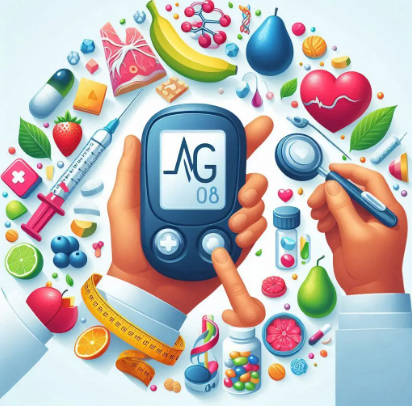Maintaining healthy blood sugar levels is essential for overall well-being, especially for those at risk of or already managing diabetes.
High or unstable blood sugar can lead to serious health complications over time, such as nerve damage, heart disease, kidney failure, and vision problems.
But here’s the good news—you can take charge of your health. This guide will walk you through how to control blood sugar levels naturally and effectively using science-backed methods, lifestyle strategies, and dietary tips.

"Table of Contents"
Understanding Blood Sugar: The Basics
Before diving into tips on how to control blood sugar levels, it’s important to understand what blood sugar is and why it matters. Blood sugar, also known as blood glucose, is the primary energy source for your body, derived mainly from the carbohydrates in the food you eat. The hormone insulin helps move sugar from your bloodstream into your cells for energy or storage.
When your body doesn’t produce enough insulin—or can’t use it efficiently—blood sugar builds up in your bloodstream. This may contribute to the development of insulin resistance, which can progress to prediabetes and eventually type 2 diabetes if not managed
Skeptical? Click the link below to see the latest research
Symptoms of High Blood Sugar
Recognizing the signs of elevated blood sugar levels is key to taking action early. Common symptoms include:
- Frequent urination
- Increased thirst
- Fatigue
- Blurred vision
- Headaches
- Unexplained weight loss
If you’re experiencing any of these symptoms regularly, it’s time to learn how to control blood sugar levels before it becomes a bigger issue.
Eat a Balanced, Low-Glycemic Diet
Your diet plays a key role in influencing your blood sugar levels. Choosing low-glycemic foods helps prevent spikes and keeps glucose levels steady.
Best Foods to Include:
- Leafy greens: Spinach, kale, and broccoli are low in carbs and packed with fiber.
- Whole grains: Brown rice, quinoa, and oats provide long-lasting energy without causing spikes.
- Lean proteins: Eggs, chicken, fish, and tofu help stabilize blood sugar.
- Healthy fats: Avocados, nuts, olive oil, and seeds reduce the glycemic load of meals.
- Non-starchy vegetables like bell peppers, zucchini, mushrooms, and cucumbers are excellent choices for supporting healthy blood sugar levels.
Foods to Avoid:
- White bread, pasta, and rice
- Sugary drinks and snacks
- Fried foods and processed meats
- Baked goods with refined flour and sugar
A good tip when learning how to control blood sugar levels is to follow the “plate method”—half of your plate should be non-starchy vegetables, one quarter lean protein, and one quarter complex carbohydrates.
Practice Portion Control
Even healthy foods can lead to blood sugar spikes if eaten in large amounts. Practicing mindful eating and portion control helps avoid overloading your system with glucose.
Simple Ways to Control Portions:
- Use smaller plates and bowls
- Read nutrition labels for serving sizes
- Don’t eat straight from the package
- Eat slowly and stop when you feel full
Portion control is a key part of any strategy that teaches you how to control blood sugar levels naturally.
Exercise Regularly
Physical activity is one of the most powerful tools for balancing blood sugar.It aids your muscles in absorbing glucose for energy and enhances insulin sensitivity.
Recommended Activities:
- Walking: A brisk 30-minute walk after meals can lower blood sugar.
- Strength training helps build muscle, which in turn increases your metabolism and supports better glucose regulation..
- Yoga and stretching: Great for stress reduction and overall balance.
Try to accumulate at least 150 minutes of moderate-intensity exercise each week, ideally spread over several days. Consistency is more important than intensity.
Stay Hydrated
Water is essential for helping your kidneys remove excess sugar from the bloodstream, while dehydration can impair your body’s ability to regulate blood glucose effectively.
Tips to Stay Hydrated:
- Drink at least 8–10 glasses of water daily
- Avoid sugary drinks like soda and fruit juices
- Add lemon, mint, or cucumber for flavor
Knowing how to control blood sugar levels includes understanding how something as simple as water can make a major difference.
Manage Stress Effectively
When you’re stressed, your body releases hormones like cortisol and adrenaline, which can raise blood sugar levels. Chronic stress is a hidden culprit behind insulin resistance.
Stress Management Techniques:
- Practicing meditation or deep breathing for just 10 minutes a day can promote relaxation and reduce stress.
- Spending time in nature: A natural way to lower cortisol
- Listening to music or reading: Find your calm
- Journaling: Helps process thoughts and emotions
Learning how to control blood sugar levels isn’t just physical—it’s emotional and mental as well.
Get Quality Sleep
Sleep is often overlooked, but it’s essential for healthy blood sugar regulation. Poor sleep can lead to insulin resistance and increase appetite for sugary foods.
Sleep Tips:
- Aim for 7–9 hours per night
- Stick to a consistent sleep schedule
- Avoid screens an hour before bed
- Limit caffeine after mid-afternoon
- Maintaining a healthy sleep routine supports better blood sugar balance..
Monitor Blood Sugar Levels
Whether you’re managing diabetes or just being proactive, regularly checking your blood sugar is vital. It helps you understand how your body responds to different foods, stress levels, and activities.
Monitoring Tips:
- Monitor your blood sugar using a glucometer or a continuous glucose monitor (CGM).
- Track readings in a journal or app
- Check your blood sugar before meals, after eating, and at bedtime.
The more informed you are, the better equipped you are to take control of your health.. This is a foundational part of learning how to control blood sugar levels on a daily basis.
Consider Natural Supplements (With Caution)
There are natural supplements that may help lower blood sugar, but always consult your doctor before adding anything new to your routine.
Popular Blood Sugar Supplements:
- Berberine: Recognized for its effectiveness, comparable to certain medications.
- Cinnamon extract: May improve insulin sensitivity
- Alpha-lipoic acid: A powerful antioxidant that may help protect against nerve damage.
- Magnesium: Supports glucose metabolism
Supplements are not a cure-all, but they can support your strategy on how to control blood sugar levels naturally.
Limit Alcohol and Quit Smoking
Both alcohol and nicotine can disrupt blood sugar levels. Alcohol can cause spikes and crashes, while smoking contributes to insulin resistance.
Safer Habits:
- Limit alcohol to one drink a day for women, two for men
- Choose low-carb drinks like dry wine or vodka with soda water
- Seek support to quit smoking—your blood sugar and heart will thank you
Small changes in these areas can significantly impact your journey to control blood sugar levels.
Consult with a Healthcare Professional
Everyone’s body is different. What benefits one person might not be effective for another. Regular checkups with a healthcare provider can help fine-tune your strategy for managing blood sugar.
Ask about:
- Blood tests like A1C
- Personalized nutrition plans
- Medication or insulin (if needed)
- Preventing long-term complications
Partnering with a professional gives you the best chance to succeed as you learn how to control blood sugar levels long term.
Final Thoughts:
Understanding how to control blood sugar levels isn’t just about managing a health condition—it’s about empowering yourself with the knowledge to live a fuller, healthier life. Through smart nutrition, regular movement, stress management, and daily awareness, you can take back control of your health—starting today.
Whether you’re trying to prevent diabetes, reverse prediabetes, or simply improve your energy and focus, the steps outlined here offer a roadmap to balanced blood sugar and overall well-being. Keep in mind, every positive step matters—no matter how small it may appear.
Key Takeaways
✅ Choose low-glycemic foods and balance your plate
✅ Practice portion control and avoid processed sugars
✅ Exercise regularly—especially after meals
✅ Stay hydrated and minimize alcohol consumption and smoking.
✅ Get enough restful sleep and manage stress
✅ Track your blood sugar and consult with a healthcare provider
If you’re ready to take charge of your health, start by applying just one or two of these strategies this week. As your habits grow stronger, so will your control over your blood sugar levels—and your life.
Disclaimer: We are a professional product review website. We might receive compensation when you buy through our website. We may earn a small commission. The information contained on this website is provided for informational purposes only and is not meant to substitute for the advice provided by your doctor or other healthcare professional. The products have not been evaluated by the Food and Drug Administration and are not intended to diagnose, treat, cure, or prevent any disease.


